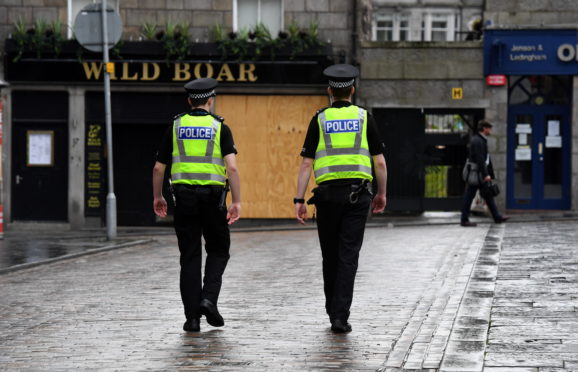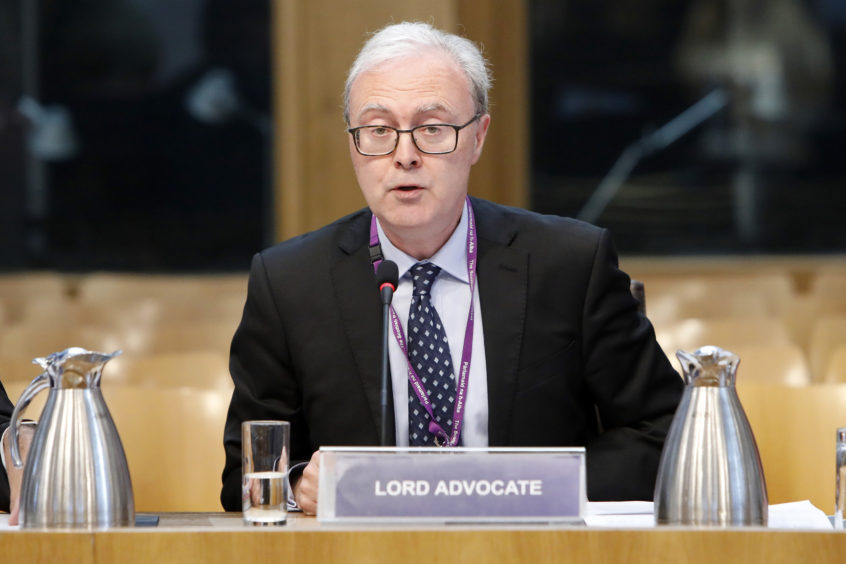The Lord Advocate has warned the coronavirus pandemic will result in further delays to the justice system as it emerged 49 homicide cases and 465 of serious sexual assault are awaiting trial.
James Wolffe QC said the backlog of thousands of cases was only going to get worse when he was questioned by MSPs about the impact of the postponement of trials during the outbreak.
For such a period that the court is unable to process cases at its normal capacity that backlog is going to continue to increase.”
Lord Advocate James Wolffe QC
Appearing in front of Holyrood’s Justice Committee, Scotland’s most senior law officer revealed sexual assault cases will not be among those dealt with when trials restart in July because of the risk of them being deserted.
Mr Wolffe also pledged that those who spit on police officers would be dealt with “robustly”, although he was unable to commit to rank-and-file officers’ demands for those accused of “Covid-19” assaults to be automatically remanded in custody.
MSPs on the Justice Committee heard that 717 cases that had been indicted were awaiting trial in the high court as of June 10.
In addition there were 1,584 indicted cases waiting to be tried in sheriff and jury courts. The figures represented an 11% increase since the beginning of March.
Of the High Court cases awaiting trial, 49 were for homicide, 465 involved serious sexual offences and a further 182 were for other major crimes.
In 238 of those High Court cases, at least one person was being held in custody pending trial. The number of cases involving at least one individual in custody in Sheriff Court cases was just over 300.
“It follows inevitably that during a period where virtually no trials are able to take place across the system that the backlog has been increasing during this period,” Mr Wolffe said. “It also follows that for such a period that the court is unable to process cases at its normal capacity that backlog is going to continue to increase.”
The head of Scotland’s prosecution service, Crown Agent David Harvie, said there were already 18,319 outstanding summary, solemn, sheriff and jury and high court cases at the end of March, an increase of 14% on the previous year.
Since then the Crown had served an additional 21,000 summary complaints, for less serious offences, across sheriff and JP courts.
“Not all of those will end up being trials but that’s an indication of the number of complaints that have been served during the lockdown,” Mr Harvie said.
Regrettably throughout lockdown one of the truths is that crime has continued. It was pretty (much) back up to normal levels in May.”
David Harvie of the Crown Office
Levels of crime had also returned to normal during the lockdown after a slight dip in April. There were 12,436 crimes reported in May, an increase from the 10,063 April figure and a return to the March levels of 12,450.
“Regrettably throughout lockdown one of the truths is that crime has continued,” Mr Harvie said. “It was pretty (much) back up to normal levels in May. Our expectations from those numbers is that will give us an extra 300 high court and 1,500 sheriff and jury cases, simply from those three months of reports.”
Looking ahead to the restarting of trials, Mr Wolffe said he was unable to give a list of premises that could be brought into use to allow cases to be heard with social distancing. But he reassured the committee the matter was being looked into.
A priority would be to hear cases where accused people were in custody and those with vulnerable witnesses. Cases that could be resolved, in the public interest, through pleas were being identified as were cases where evidence could be agreed. Fatal Accident Inquiries and appeal hearings could be heard virtually.
Mr Wolffe said he was “sceptical” about the ability to manage a solemn trial – for more serious cases – virtually, although remote technology could be used for the taking of evidence.
But there had been three virtual summary trials in the Highlands and islands last week, which were being evaluated.
“There is scope for virtual hearings for a proportion of summary business,” the Lord Advocate said. “That will be a really critical part of the path forward because of the constraints that running solemn trials is going to place on the physical estate. So the ability to do a proportion of the summary business virtually will be an important feature.”
Mr Wolffe said it would not be possible to stage all summary trials virtually, noting that there were cases where it was important that witnesses attended physically.
Sex offence trials will not be heard at the outset of the resumption of trials
When trials begin again next month, Mr Wolffe said they would only deal with “single accused” at first and sex crime cases would not be heard to begin with.
“We are not anticipating dealing with sexual offences in the early period because of the concerns about cases being deserted for one reason or another,” the Lord Advocate said.
Mr Wolffe was questioned about Scottish Police Federation calls for the imprisonment of anyone accused of a so-called “Covid-19 crime”, which includes spitting or coughing at an officer.
The Lord Advocate said such offences were “reprehensible”, adding that he had been “very clear” they would be prosecuted “robustly”.
He added that he had recently intervened on appeal to increase a four-month sentence imposed by a sheriff to 10 months.
But he said that police applied a statutory framework when making arrests and it was “not possible to have a blanket rule” for all individuals to be remanded in custody.

